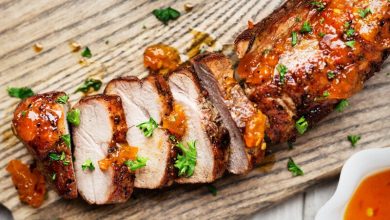🍔🔥 Backyard BBQ Sauce 🍖🍅
Backyard BBQ sauce is a delightful, flavorful condiment that’s often used to enhance the taste of grilled or smoked meats. It’s a staple at outdoor barbecues and has a rich history in American culinary traditions. 🇺🇸🍗
📜 History:
The origins of BBQ sauce can be traced back to Native American, African, and Caribbean culinary traditions. However, its popularity skyrocketed in the United States during the early 20th century. Different regions in the U.S. developed their unique styles of BBQ sauce, ranging from the vinegary and peppery sauces of North Carolina to the sweet and smoky sauces of Kansas City and Texas. The backyard BBQ sauce we know today is a fusion of these diverse regional styles.
🧪 Components:
Backyard BBQ sauce typically consists of a base made from ingredients such as:
- Tomato Sauce/Paste: Provides the foundational tomato flavor.
- Vinegar: Adds tanginess and acidity.
- Sweetener: Commonly brown sugar or molasses for sweetness.
- Spices: Paprika, cayenne, garlic powder, and onion powder for flavor.
- Liquid Smoke: To mimic the smoky flavor of traditional BBQ.
- Worcestershire Sauce: For depth and complexity.
You can adjust the quantities of these ingredients to suit your taste.
👩🍳 Preparation:
Here’s a basic recipe for preparing backyard BBQ sauce:
Ingredients:
- 1 cup tomato sauce or tomato paste
- 1/2 cup vinegar (apple cider vinegar or white vinegar)
- 1/2 cup brown sugar
- 2 tablespoons molasses
- 1 teaspoon paprika
- 1/2 teaspoon cayenne pepper
- 1 teaspoon garlic powder
- 1 teaspoon onion powder
- 2 tablespoons Worcestershire sauce
- 1-2 teaspoons liquid smoke (adjust to taste)
- Salt and pepper to taste
Steps:
- In a saucepan, combine the tomato sauce, vinegar, brown sugar, and molasses.
- Stir over medium heat until the sugar dissolves.
- Add the paprika, cayenne, garlic powder, onion powder, and Worcestershire sauce. Stir well.
- Simmer the sauce on low heat for about 10-15 minutes, allowing it to thicken.
- Taste and adjust the flavor with salt, pepper, and additional spices if needed.
- Finally, add the liquid smoke and stir it in.
🕒 Time:
The preparation of backyard BBQ sauce typically takes around 20-30 minutes, including the cooking time. This time frame allows the flavors to meld and the sauce to thicken, resulting in a rich and delicious sauce for your BBQ adventures.
Remember that this is a basic recipe, and you can experiment with the ingredients to create your own signature BBQ sauce, whether you prefer it sweeter, spicier, or smokier. Enjoy your BBQ sauce-making journey! 🍖🍔🌞👨🍳👩🍳
Certainly, here are some nutrition facts and health information for the basic backyard BBQ sauce recipe:
Nutrition Facts (Approximate Values for 1 serving – 2 tablespoons):
- Calories: 50-60 kcal
- Total Fat: 0g
- Saturated Fat: 0g
- Cholesterol: 0mg
- Sodium: 200-300mg (varies based on salt added)
- Total Carbohydrates: 14-16g
- Dietary Fiber: 0g
- Sugars: 13-15g (mainly from brown sugar and molasses)
- Protein: 0g
Health Information:
-
Calories: BBQ sauce is relatively low in calories. However, if you’re watching your calorie intake, be mindful of portion sizes, as these calories can add up quickly.
-
Fat: Backyard BBQ sauce is typically low in fat, making it a healthier choice than some other condiments. It is usually fat-free, which is good for those on a low-fat diet.
-
Sodium: The sodium content can vary depending on how much salt you add. High sodium intake is associated with health issues, so it’s essential to moderate your consumption if you have high blood pressure or other sodium-related concerns.
-
Sugars: BBQ sauce contains a significant amount of sugar, mainly from brown sugar and molasses. While the sweetness is a desirable aspect of the sauce, it’s important to be aware of sugar content, especially if you are watching your sugar intake.
-
Nutrient Density: BBQ sauce does not provide significant vitamins or minerals, but it can enhance the flavor of foods and make them more enjoyable. It’s best enjoyed in moderation as a condiment rather than a main source of nutrition.
-
Allergens: BBQ sauce ingredients can vary, so be sure to check labels if you have allergies or dietary restrictions. Some sauces may contain common allergens like gluten, soy, or tree nuts.
-
Homemade vs. Store-Bought: Making your BBQ sauce at home allows you to control the ingredients and reduce additives and preservatives often found in commercial sauces. You can also adjust the recipe to suit your dietary preferences.
Remember that these values are approximate and can vary based on the specific ingredients and quantities you use. If you have specific dietary concerns, such as allergies, diabetes, or other health conditions, it’s essential to consult with a healthcare professional or a registered dietitian for personalized advice. Enjoy your BBQ sauce in moderation as part of a balanced diet. 🍖🥗👨⚕️🥄




